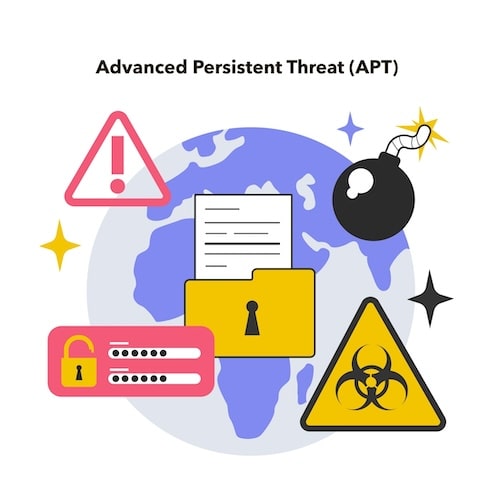Advanced Persistent Threat (APT)
Advanced Persistent Threats (APTs) are sophisticated, targeted cyberattacks aimed at stealing valuable data, compromising sensitive information, or sabotaging critical infrastructure. Unlike other forms of cyber threats that might seek immediate financial gain, APTs are designed for long-term espionage and strategic disruption.

Targeting and complexity:
APTs focus on high-value targets such as large corporations and government agencies. These attacks are meticulously planned and executed, making them significantly more complex than typical web application threats.
Consequences of APT attacks:
Intellectual property theft: This includes trade secrets, patents, and other proprietary data critical to a company's competitive advantage.
Compromise of sensitive information: Personal data of employees and users can be exposed, leading to massive privacy breaches.
Sabotage of critical infrastructure: This might involve deleting crucial databases or taking over entire sites, severely disrupting operations.
Total site takeovers: Attackers gain control over an organization’s entire digital presence, manipulating it at will.
Execution and resources: Executing an APT requires substantial resources, including a team of skilled cybercriminals with considerable financial backing. Some are even government-funded, serving as tools of cyber warfare.
APT attack progression:
Infiltration: Attackers gain initial access through compromised web assets, network resources, or human operators, often using techniques like SQL injection, remote file inclusion, or spear phishing. DDoS attacks may be used as a distraction and to weaken security perimeters.
Expansion: Once inside, attackers expand their foothold, moving laterally through the network to compromise high-level accounts and gather critical business information. This stage might involve placing Trojans and backdoors that appear as legitimate software, enabling stealthy, remote operations.
Extraction: Stolen data is collected and stored securely within the compromised network. Extraction is carefully timed, often accompanied by diversion tactics like DDoS attacks to mask the data exfiltration process.
APTs represent a major security challenge due to their stealth, sophistication, and the significant damage they can inflict. Protecting against them requires advanced security measures, continuous monitoring, and a proactive incident response strategy. By implementing advanced cybersecurity solutions like as Guardio, organizations can significantly enhance their ability to detect and respond to these threats before they cause irreparable damage, ensuring a robust defense against the complexities of APTs.
Guardio offers comprehensive monitoring and security features designed to identify suspicious activities and potential breaches early in the attack cycle. This proactive approach allows for immediate containment and mitigation of threats, safeguarding critical data and maintaining the integrity of network infrastructure. Utilizing such cybersecurity software is a vital component in the defense strategy against the sophisticated and covert nature of APTs, ensuring that businesses can operate securely in an increasingly hostile digital landscape.
have only had Guardio for a short…
I have only had Guardio for a short time. In that time I feel that it has protected me against Spyware & Malware~ I would recommend this service~
Deb Ryan
Trustpilotit works- I used to have stuff happen about twice a year- uardio warns me any time something looks fishy
John Robert Fleming
FacebookGreat experience with Guardio
Great experience with Guardio. Works behind the scenes so smoothly with no pop ups etc.I love how it would only notify me when anything tries to access my private information. Great job well done!!
Esther Alei Tafa
Trustpilot